MONTHLY BLOG 6, RECONSIDERING REVOLUTIONS
If citing, please kindly acknowledge copyright © Penelope J. Corfield (2011)
Revolution – metamorphosis – transformation – disjunction – diagenesis – dialectical leap forward – paradigm shift. Marvellous long words and phrases, such as these (and many more), collectively express the sense of drastic upheaval that is contained within the concept of macro-change.
And yes, great turbulent upheavals occur not only in the natural world (earthquakes, volcanoes, tempests, floods, fires) but in human societies too. Not surprising, really. We are part of the whole and so subject to the same intricate mix of continuities/gradual changes/ and macro-changes that interact seamlessly throughout the cosmos.
But, talking of great transformations, three distinctions can be made.
Firstly, language. The term ‘revolution’ is far too often over-used. It has become tired, lacking the punch and clarity that such a concept should retain. So we need a smarter vocabulary to differentiate between the different categories of radical upheaval.
My own advice is to reserve ‘revolution’ for violent and/or transformational upheavals of systems of government. (Here the reference is to something more drastic than a coup, which changes the leadership without changing the regime). Political revolutions are distinctive. They are characterised by mass action, which aims at rejecting, with violence if need be, an established system of rule with its associated power structures, and at installing something qualitatively different. Political revolutions accordingly differ from other forms of macro-change.
After all, is it analytically helpful to name the process of industrialisation as the Industrial Revolution, when it unfolded over decades, even centuries? The shift from a human- and animal-powered economy to one dependent upon mechanical power was truly epic. But its advent incorporated both dramatic innovations and slower evolutionary adaptations. So why not call it a Technological Transformation? Such a name acknowledges the magnitude of change but does not confine change to one revolutionary moment or movement.
For example, the first steam-powered cotton-looms were truly remarkable. They dramatically increased productivity as well as changed patterns of working, as the male handloom weavers in their homes were ousted by machine-minders in large factories [shown below in an early nineteenth-century illustration]. Yet the clerical inventor Edmund Cartwright (1743-1823), who patented his steam-powered loom in 1785, failed financially. It took decades for his pioneering invention to be adopted, adapted and further upgraded; and centuries for mechanical power to become so essential in so many human activities world-wide, as it is today. Technological transformations need therefore to be analysed with a different set of terms and concepts.
 Secondly: political revolutions also need to be located within a spectrum of different sorts and degrees of change. It is very rarely, if ever, that everything is transformed all at once. The rhetoric of dramatic metamorphosis is both fearful and hopeful: ‘All changed, changed utterly;/ A terrible beauty is born’, as Yeats saluted the Irish Easter Rising in 1916. Yet, when the dust dies down, continuity turns out to have dragged at the heels of revolution after all. What is known as admirable heritage to its fans is deplorable inertia to its critics. Thus Karl Marx once denounced with righteous passion: ‘the tradition of all the dead generations [that] weighs like a nightmare on the brains of the living’.
Secondly: political revolutions also need to be located within a spectrum of different sorts and degrees of change. It is very rarely, if ever, that everything is transformed all at once. The rhetoric of dramatic metamorphosis is both fearful and hopeful: ‘All changed, changed utterly;/ A terrible beauty is born’, as Yeats saluted the Irish Easter Rising in 1916. Yet, when the dust dies down, continuity turns out to have dragged at the heels of revolution after all. What is known as admirable heritage to its fans is deplorable inertia to its critics. Thus Karl Marx once denounced with righteous passion: ‘the tradition of all the dead generations [that] weighs like a nightmare on the brains of the living’.
There are other forces within history as well as the desire for radical change. Accordingly, theories of history which assume revolution to be the sole mechanism of change are one-sided and need correction. That criticism applies both to Hegel’s dialectical combustion of conflicting ideals, which each time led to the emergence of a new historical stage; and to the Marxist version of revolutionary conflict in the form of dialectical materialism. For Karl Marx and his loyal co-thinker Friedrich Engels the growing tensions from class conflict would eventually ignite great political revolutions, each one propelling a new social class into power.
 Yet no. Not only does fundamental change frequently develop via evolutionary rather than revolutionary means; but revolutions do not always introduce macro-change. They can fail, abort, halt, recede, fudge, muddle, diverge, transmute and/or provoke counter-revolutions. The complex failures and mutations of the communist revolutions, which were directly inspired in the twentieth century by the historical philosophy of Marx and Engels, make that point historically, as well as theoretically.
Yet no. Not only does fundamental change frequently develop via evolutionary rather than revolutionary means; but revolutions do not always introduce macro-change. They can fail, abort, halt, recede, fudge, muddle, diverge, transmute and/or provoke counter-revolutions. The complex failures and mutations of the communist revolutions, which were directly inspired in the twentieth century by the historical philosophy of Marx and Engels, make that point historically, as well as theoretically.
Thirdly, therefore: revolutions are not all the same and are not all automatically successful. Drastic upheaval through direct action is sometimes the only way to effect change.
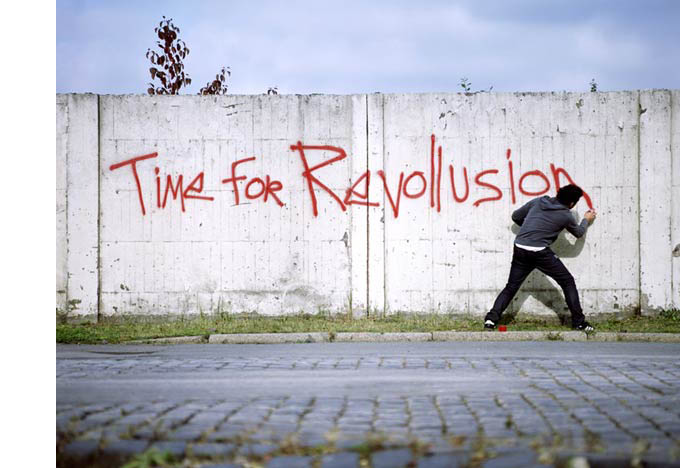
|
A youthful enthusiast at the Berlin Wall before its fall – |
The concept can exert a radical charm all its own, especially in prospect – before any bloodshed. ‘Let a thousand flowers bloom’. ‘O brave new world’. Yet rosy dreams may turn to horror. Brightness can turn to night. ‘Musing on roses and revolutions,/ I saw night close down on the earth like a great dark wing …/ And I heard the lamentations of a million hearts’, as the African American poet Dudley Randall wrote sombrely in 1968, aware that radical hopes would not easily transform the long after-history of African slavery.
So within the revolution, remember that it is easier to unite against what is not wanted than to agree on what is wanted instead. When the old regime has gone, it is important to keep talking rather than to switch to fighting one’s own side. Don’t let the revolution consume its own children. Don’t let the new regime mimic the faults of its predecessor. Use the great heroic power of revolutionary transformation to break from violence into new dialogue and new construction, taking time to engage with evolution and to tame old continuities.
|
Celebrations in Cairo’s Tahrir Square on 12 February 2011 after the resignation of Hosni Mubarak as Egypt’s President. Copyright ©nebedaay’s photostream 2011 |
Lastly, is there a periodicity to political revolutions? Do they come in any predictable pattern? In fact, again no. History would be tidier and easier to understand if it were so. Nonetheless, there is often a chance (not an inevitability) of a political uprising, even under the most repressive regimes, with each bold new generation of young people – every twenty years or so. We are currently witnessing the opportunity for real political transformations in the Arab world. Let it be beauty and not terror that forthcomes.
For further discussion, see Twitter
To read other discussion-points, please click here
To download Monthly Blog 6 please click here


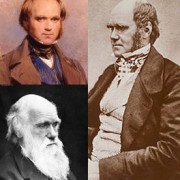
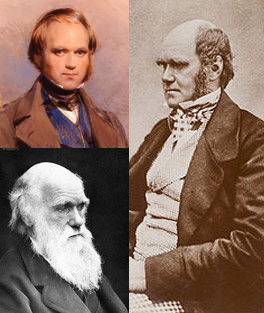 Lastly, for historians, it is also not surprising to find that gradual change is a powerful force in human history. There are many long-term trends that are slow and relatively imperceptible at the time. One example is the world-wide spread of literacy since circa 1700. Certainly there have been oscillations in the trend; but it is unlikely to be reversed, short of global catastrophe.
Lastly, for historians, it is also not surprising to find that gradual change is a powerful force in human history. There are many long-term trends that are slow and relatively imperceptible at the time. One example is the world-wide spread of literacy since circa 1700. Certainly there have been oscillations in the trend; but it is unlikely to be reversed, short of global catastrophe.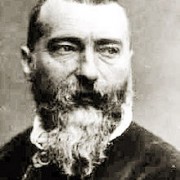
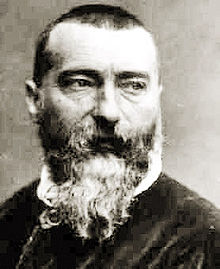 Of course, Karr was not completely right. Changes undoubtedly do happen, both gradually and dramatically. But they are always tempered by the power of Continuity. In fact, innovations may fail or prove to be counterproductive – either because opponents consciously strive to circumvent change – or because the innovations are imperfectly planned and/or implemented – or because the innovations have anyway little intrinsic chance of success.
Of course, Karr was not completely right. Changes undoubtedly do happen, both gradually and dramatically. But they are always tempered by the power of Continuity. In fact, innovations may fail or prove to be counterproductive – either because opponents consciously strive to circumvent change – or because the innovations are imperfectly planned and/or implemented – or because the innovations have anyway little intrinsic chance of success.